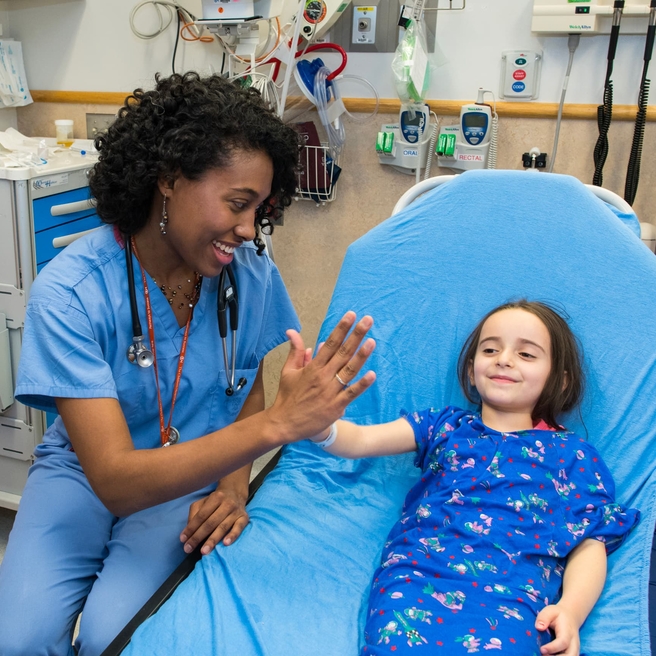What are abdominal organ injuries?
Abdominal organ injuries in children describe injuries to organs in the abdomen. These organs include the liver, spleen and kidneys.
The liver is located in the right upper abdomen. It is the biggest organ in the abdomen The spleen is found in the upper left abdomen, behind and below the stomach The kidneys are on each side of the spine, in the back and just above the waist
How do abdominal organs get injured?
Abdominal organ injuries in children are often caused by blunt trauma, including car accidents, falls, sports accidents, or being hit with an object.
Penetrating trauma (gunshot or stab wound) can also cause these injuries although these are less common in children.
What symptoms will my child have if they have an injury to an abdominal organ?
Symptoms may be slightly different depending on that organ that is injured, but some common symptoms include:
- Pain in the abdomen
- Guarding (Holding hand over the painful area)
- Sick feeling in the stomach or throwing up
- Loss of appetite
- Hard, bloated abdomen
- Pain in the left shoulder (Spleen injuries)
- Your child can have an abdominal organ injury without visible damage to the skin, such as bruising or cuts
- Children with kidney injuries may have pain in their back or abdomen or blood in their urine
How do you diagnose these injuries?
- Chest CT/CAT Scan: This test creates a three-dimensional (3D) picture of the abdominal organs and allows us to see which organs are injured and the extent of the injury. We rate injuries from grade 1 to grade 5, with 5 being the most severe.
- Complete Blood Count (CBC): Bloodwork to look for signs of bleeding.
- Renal/Bladder Ultrasound: Sound waves are used to produce images of the organs, including the kidneys and bladder.
Treatment for abdominal organ injuries
Most children with injuries to an abdominal organ are able to heal on their own and are carefully watched in the hospital for 1-3 days. During the hospitalization, your child may not be allowed to eat or get out of bed for a period of time.
While your child is in the hospital, we will follow their blood test results, heart rate, blood pressure, breathing, and pain level for any signs of continued bleeding.
If your child’s injury is severe and they have a lot of blood in the abdomen, they may need a blood transfusion or surgery.
If your child has a severe kidney injury, a doctor from Urology will be asked to examine your child and help make a plan for their care.
Follow-up care after an abdominal organ injury
Please see the specific discharge instructions for your child in your discharge paperwork. It will tell you about activity restrictions and follow-up appointments.
Who do I call with questions after discharge?
For questions or concerns about your child during business hours, please call your child’s pediatrician or the trauma clinic at 215-590-5932. If you have a question or concern on evenings, nights, or weekends, please call 215-590-1000 and ask the operator to page the Trauma Fellow on call.
Resources to help
Trauma Center Resources
Caring for a child who has suffered an injury can be overwhelming. We have resources to help answer to your questions and make this time in your family’s life a bit easier.
